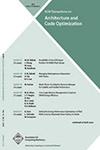一个GPU加速的高效混合精度大规模FFT框架
IF 1.8
3区 计算机科学
Q4 COMPUTER SCIENCE, HARDWARE & ARCHITECTURE
引用次数: 0
摘要
快速傅里叶变换(FFT)在大规模并行程序的计算应用中得到了广泛的应用,而数据通信是FFT的主要性能瓶颈,严重影响其并行效率。为了解决这个问题,我们提出了一种新的大规模FFT框架MFFT,它采用一种新的混合精度优化技术,采用“高精度计算,低精度通信”的策略来优化并行FFT。为了实现“低精度通信”,我们提出了一种共享指数浮点数压缩技术,该技术在保持较高精度的同时减少了数据通信量。此外,我们还采用了一种两阶段归一化技术来进一步减小舍入误差。在混合精度MFFT框架的基础上,采用了GPU内核流化、MPI消息组合、内核优化和内存优化等优化技术来提高性能。我们在一个有4,096个gpu的系统上评估MFFT。结果表明,共享指数MFFT比双精度MFFT平均快1.23倍,双精度MFFT的性能比开源库2Decomp&FFT(基于cpu的版本)和heFFTe(基于AMD gpu的版本)分别平均高3.53倍和9.48倍。与2Decomp&FFT相比,双精度MFFT的并行效率从53.2%提高到78.1%,共享指数MFFT的并行效率进一步提高到83.8%。本文章由计算机程序翻译,如有差异,请以英文原文为准。
MFFT: A GPU Accelerated Highly Efficient Mixed-Precision Large-Scale FFT Framework
Fast Fourier transform (FFT) is widely used in computing applications in large-scale parallel programs, and data communication is the main performance bottleneck of FFT and seriously affects its parallel efficiency. To tackle this problem, we propose a new large-scale FFT framework, MFFT, which optimizes parallel FFT with a new mixed-precision optimization technique, adopting the “high precision computation, low precision communication” strategy. To enable “low precision communication”, we propose a shared-exponent floating-point number compression technique, which reduces the volume of data communication, while maintaining higher accuracy. In addition, we apply a two-phase normalization technique to further reduce the round-off error. Based on the mixed-precision MFFT framework, we apply several optimization techniques to improve the performance, such as streaming of GPU kernels, MPI message combination, kernel optimization, and memory optimization. We evaluate MFFT on a system with 4,096 GPUs. The results show that shared-exponent MFFT is 1.23 × faster than that of double-precision MFFT on average, and double-precision MFFT achieves performance 3.53× and 9.48× on average higher than open source library 2Decomp&FFT (CPU-based version) and heFFTe (AMD GPU-based version), respectively. The parallel efficiency of double-precision MFFT increased from 53.2% to 78.1% compared with 2Decomp&FFT, and shared-exponent MFFT further increases the parallel efficiency to 83.8%.
求助全文
通过发布文献求助,成功后即可免费获取论文全文。
去求助
来源期刊

ACM Transactions on Architecture and Code Optimization
工程技术-计算机:理论方法
CiteScore
3.60
自引率
6.20%
发文量
78
审稿时长
6-12 weeks
期刊介绍:
ACM Transactions on Architecture and Code Optimization (TACO) focuses on hardware, software, and system research spanning the fields of computer architecture and code optimization. Articles that appear in TACO will either present new techniques and concepts or report on experiences and experiments with actual systems. Insights useful to architects, hardware or software developers, designers, builders, and users will be emphasized.
 求助内容:
求助内容: 应助结果提醒方式:
应助结果提醒方式:


